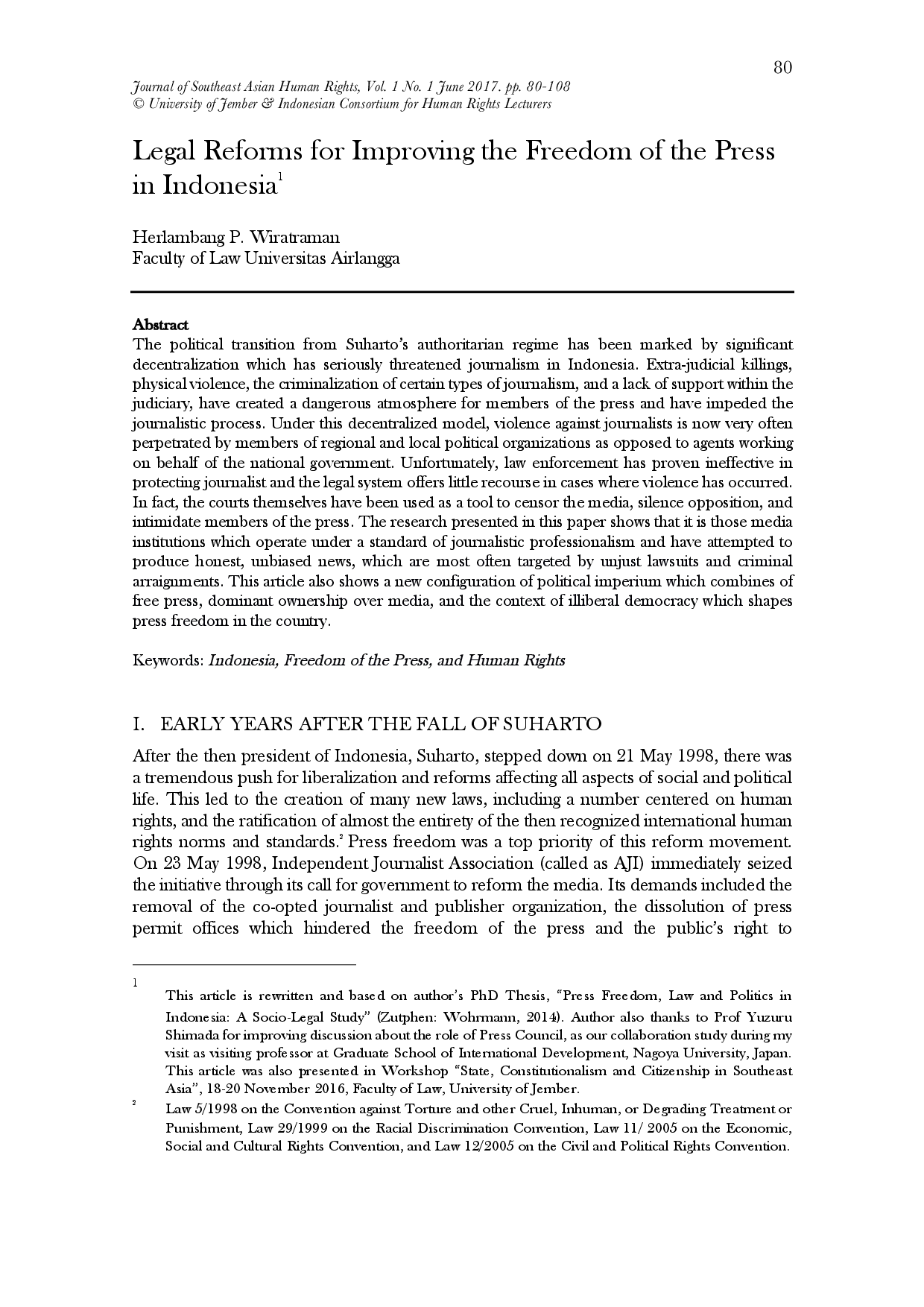UNEJUNEJ
Journal of Southeast Asian Human RightsJournal of Southeast Asian Human RightsIslam is by far the largest religion in Indonesia, and given the size of Indonesias population and the massive percentage of which follow identify as Muslim, Indonesia becomes the biggest Muslim majority country. In light of this reality, Islam becomes the societys dominant role of conduct. As to be predicted in such a system, a social hierarchy has developed in which Indonesian Muslims enjoy the most privileges. Such a situation has created a fertile ground for the possible use of what Pierre Bourdieus call symbolic violence. As a consequence, there is a tendency for the minor group of Indonesian people to be marginalized. Sadly, this seems to be exacerbated by the rise of Islamic conservativism and radicalisation in post-1998 Indonesia. That says, their lack of capability in recognizing minoritys rights often leads to religious intolerance. Considerably, as to solve such a situation, widening perspective as well as strengthening inter-group and inter-religion dialogue is required.
In conclusion, Bourdieus concept of symbolic violence is relevant in understanding the dynamics of power and social inequality in Indonesia.The dominance of Islamic values and practices, coupled with a lack of intergroup dialogue and critical thinking, can lead to marginalization and intolerance toward minorities.Cultivating openness, mutual respect, and a commitment to inclusivity are crucial steps toward fostering a harmonious and just society, ensuring equal rights and opportunities for all citizens regardless of faith or background.A critical approach to education and the promotion of dialogue are vital to counter radicalization and build a more tolerant and equitable future for Indonesia.
Further research should investigate the role of social media in amplifying religious intolerance and shaping public opinion among young Indonesians. This could encompass analyzing the spread of hate speech and exploring effective counter-narratives to promote inclusivity. Additionally, studies are needed to assess the effectiveness of existing educational curricula in fostering interfaith understanding and critical thinking skills among students. Investigating the potential of community-based initiatives, such as interfaith dialogues and collaborative projects, to bridge divides and build trust between different religious groups is also essential. Finally, reinforcing legal protections for religious minorities and ensuring their full participation in civic life by holding the perpetrators of violent acts accountable would provide a stronger foundation for religious freedom and tolerance within Indonesian society.
| File size | 580.83 KB |
| Pages | 24 |
| DMCA | ReportReport |
Related /
RESCOLLACOMMRESCOLLACOMM Efisiensi portofolio syariah tetap kompetitif berdasarkan rasio Sharpe, dan komposisi optimal didominasi oleh saham BTPS. Secara keseluruhan, portofolioEfisiensi portofolio syariah tetap kompetitif berdasarkan rasio Sharpe, dan komposisi optimal didominasi oleh saham BTPS. Secara keseluruhan, portofolio
UNEJUNEJ Depresi dan penurunan kesehatan fisik sering dilaporkan, sementara anak‑anak pengungsi tidak dapat mendaftar di pendidikan formal. Mengingat kurangnyaDepresi dan penurunan kesehatan fisik sering dilaporkan, sementara anak‑anak pengungsi tidak dapat mendaftar di pendidikan formal. Mengingat kurangnya
UNEJUNEJ The case of East Kalimantan Province was selected due to its status as one of the most resource-rich provinces of Indonesia. However, the provinces wealthThe case of East Kalimantan Province was selected due to its status as one of the most resource-rich provinces of Indonesia. However, the provinces wealth
UNEJUNEJ Penelitian ini menunjukkan bahwa lembaga media yang beroperasi dengan standar profesionalisme jurnalistik dan berupaya menghasilkan berita jujur dan tidakPenelitian ini menunjukkan bahwa lembaga media yang beroperasi dengan standar profesionalisme jurnalistik dan berupaya menghasilkan berita jujur dan tidak
Useful /
RESCOLLACOMMRESCOLLACOMM Futsal menjadi kegiatan ekstrakurikuler paling direkomendasikan dengan nilai preferensi tertinggi, diikuti oleh Bola Voli dan Pramuka, sedangkan RandaiFutsal menjadi kegiatan ekstrakurikuler paling direkomendasikan dengan nilai preferensi tertinggi, diikuti oleh Bola Voli dan Pramuka, sedangkan Randai
RESCOLLACOMMRESCOLLACOMM The results indicate that each method produces different estimates, with the PUC method yielding a slightly higher total liability. The AAN method offersThe results indicate that each method produces different estimates, with the PUC method yielding a slightly higher total liability. The AAN method offers
UINSIUINSI Hijab, jilbab atau khimar dikenal sebagai selembar pakaian yang biasanya digunakan wanita muslimah untuk memenuhi perintah Tuhannya. Penggunaan jilbabHijab, jilbab atau khimar dikenal sebagai selembar pakaian yang biasanya digunakan wanita muslimah untuk memenuhi perintah Tuhannya. Penggunaan jilbab
USKUSK This journal, Studies in English Language and Education (SiELE), serves as a platform for scholarly work in the field of English language teaching andThis journal, Studies in English Language and Education (SiELE), serves as a platform for scholarly work in the field of English language teaching and







